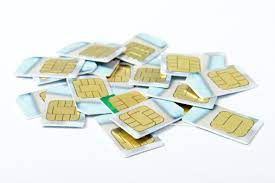By the end of May in 2023, more than 11 million mobile subscribers in Ghana who are not registered will have their service blocked.
According to Joe Anokye, Director-General of the National Communications Authority (NCA), Ghana has 11 million active but unregistered SIMs, and all of those SIMs would be terminated at the end of this month.
Exempted subscribers such as diplomats and refugees, in addition to Ghanaians serving official tasks outside of the West African nation, are included among the 11 million SIM cards that have not been registered.
According to Anokye, “All SIM cards which have not at least gone through the first phase of registration (linkage to the Ghana Card) will be removed from all networks by May 31, 2023.”
The initial step in the process of registering a SIM card required citizens to link their national identity cards, which are referred to as “Ghana Cards” in the country’s vernacular, to their SIM cards. In the second stage, citizens will have to have their biometrics scanned at a physical store or by using the camera function on the SIM registration app on their mobile devices.
The process of registering SIM cards in Ghana began in October 2021, although the deadline has been pushed back several times. In addition, a self-service SIM registration app was made available to citizens of the nation in August of 2022.
At the beginning of the registration process, there were 42.75 million active SIMs with various identification forms such as National Health Insurance Authority (NHIA) cards, passports, and driving licences; however, the Director-General indicated that the majority of these identification forms were not checked when they were used to register SIMs.
Read also: FG lower exercise tax on telecommunications services in Nigeria
The Director-General of the National Communications Authority (NCA), Ghana Explains Further
According to Anokye, “Out of the 36.57 million SIMs registered by April 25, 2023, 25.45 million SIMs had completed both Stage One and Stage Two of registration using their Ghana Card.” This indicates that these SIMs are fully registered and are recorded in the central SIM database.
“SIM registration is a key national assignment fundamental to our digital transformation agenda. It is critical for the building of trust and confidence in the use of telecommunications, financial and other essential services,” he went on to say.
The National Crime Agency (NCA) disproved rumours that the SIM registration database had been hacked.
“We wish to assure the general public that the SIM database has not been breached. Ghana now has a SIM database that has integrity, he went on to say.
Aside from that, MTN Ghana has successfully reconnected 1.9 million SIM cards that had been rendered inoperable as a result of the nationwide SIM re-registration.
After users finished the second phase of the registration process, which was about capturing their biometric information, their SIM cards were reconnected.
The current trend in SIM registration Across Africa
Many nations in Africa have begun requiring their citizens to register their SIM cards, claiming that this is a necessary step in the fight against SIM card fraud.
Recently, the Regulatory Authority for Communications of Mozambique (INCM) made an announcement that it will implement new rules within the next six months regarding the registration of SIM cards for the 15 million people who subscribe to telecoms services in the country.
The Tanzania Communications Regulatory Authority (TCRA) put back its SIM verification process a few times in January 2023, while the Communications Regulatory Authority of Namibia (CRAN) formally launched the process of registering required SIM cards in that nation. Both of these events took place in January.
Some of Africa’s telecommunications companies have had a difficult time meeting the stringent deadlines imposed by their respective governments. Since December of 2020, Nigeria has been in the midst of a SIM registration drive, and the country has been forced to push back its target date for completion of the procedure multiple times.




